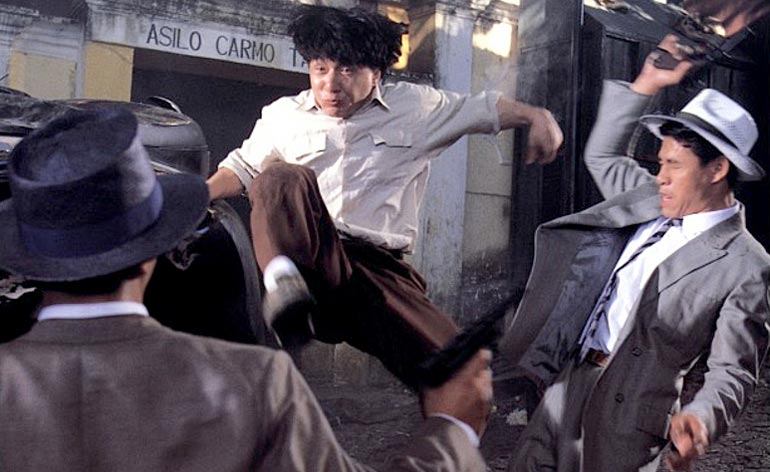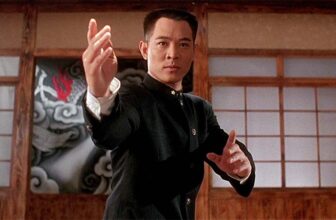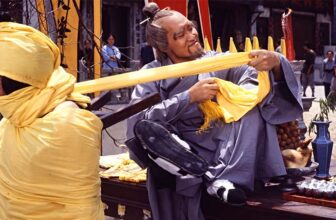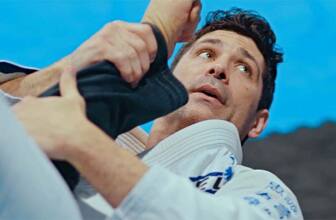
Hong Kong action comedy film directed and written by Jackie Chan, who also starred in the lead role and worked as stunt co-ordinator. Taking cues from Frank Capra’s “Lady for a Day” and “Pocketful of Miracles” the film is set in 1930’s Hong Kong. The film was released under several alternative titles in different territories, including “Mr Canton and Lady Rose” (Hong Kong English title), “Black Dragon” (USA) “Miracles: The Canton Godfather” (UK video title) and “The Canton Godfather” (Australia).
Trailer
Cast
Jackie Chan plays “Kuo Cheng-Wah”, a kind-hearted country boy whose fighting talents quickly see him rise up the ranks in a shady world of mobsters.
Jackie’s close friend, the late great Hong Kong singer and actress Anita Mui stars as “Yang Luming”, a nightclub singer. As a singer Anita was known as the “Madonna of Asia”. As an actress she has appeared in “Drunken Master II“, “Moon Warriors”, “Rumble in the Bronx” and “The Heroic Trio”, to name but a few. A familiar face to Hong Kong movie fans is Wu Ma as “Uncle Hoi”, who helps Kuo adjust to the lifestyle of a mobster. Wu Ma has appeared in over 240 films including “A Chinese Ghost Story“, “The Prodigal Son“, “Encounters of the Spooky Kind“, “Project A“, “Twinkle Twinkle Lucky Stars” and “Mr. Vampire“.
Comic actor Richard Ng, who is best known for the “My Lucky Stars” and “Pom Pom” series of films, along with his appearances in “Wheels on Meals” and “Millionaire’s Express“, plays the bumbling “Chief Inspector Ho”. Lo Lieh, who first hit the big time in the 1972 classic “King Boxer/Five Fingers of Death”, stars as “Fei”, a direct rival to Kuo’s position as the boss. He went on to star in many Shaw Brothers hits including “Heroes of Shaolin”, “The 36th Chamber of Shaolin”, “Dirty Ho” and “Mad Monkey Kung Fu”. He had previously appeared opposite Jackie Chan in “Dragons Forever”, and would later feature in “Police Story 3: Supercop”.
Veteran Taiwanese actor and director Ko Chun-hsiung plays “Tiger”, a rival gang boss. Ko appeared in over 200 films from the 1960’s onwards. He won several Best Actor awards and in 2005 was named as one of the “100 Outstanding Artists in Chinese Film (1905 – 2004)”. Also hailing from Taiwan is actress Yah-Leh Gui as “Madam Kao/Lady Rose”. Jackie’s regular co-star from the “Police Story” movies, Bill Tung plays the dodgy conman “Tung”.
Other familiar faces from popular Hong Kong movies who make appearances include Gloria Yip, Jacky Cheung, Billy Chow, Billy Lau, Mars and Ken Lo.
Plot
Kuo is a simplistic young man from the countryside who is quickly swindled out of his money when he arrives in 1930’s Hong Kong. Madame Kao, a poor woman selling flowers on the street, urges Kuo to buy a red rose, saying it will bring him luck. Reluctantly he does so, and his fortunes change instantly when Kuo stumbles into the middle of a Mob war. The dying mob boss that Kuo assists names him as his successor, much to the chagrin of gangster Fei and many of the gang members, who felt he was the natural heir.
Kuo attributes his luck to Madame Kao’s rose, and purchases one from her everyday thereafter. He discovers that Madame Kao has led her newly-engaged daughter, Belle, to believe she is a member of Hong Kong’s wealthy high society. Kuo with the assistance of Yang Luming, a singer in his nightclub, decide to make Madame Kao a “Lady for a Day” so as not to disappoint Belle’s well-heeled fiancé and his family.
In the meantime, Fei manipulates rival gang boss Tiger and turns him against Kuo. Contrary to his better nature Kuo must somehow keep the mob business running, whilst seeing off his rivals and ensuring Madame Kao is not disgraced.
Action
The action kicks off sans Jackie Chan in a scene reminiscent of a James Cagney gangster film. Grand old 1930’s cars roll up in a timber yard for a stand off between two mob bosses. It quickly descends into a shootout complete with the customary “tommy guns”, an essential accessory for any Depression-era gangster. The battle quickly moves into the town where Jackie is buying his first “lucky rose”, with an impressive car stunt down a stone staircase. Jackie springs into action against two armed thugs to protect the victims in the smashed car, utilising a wicker basket as an improvised weapon. Unbeknownst to Jackie, it is a mob boss he has tried to save who consequently names Jackie as his successor with his dying breath.
To gain face with his new gang, Jackie arm wrestles one of the hoodlums, but it just leads to a mass brawl. The ensuing fight features classic Jackie Chan action in a similar vein to which audiences had come to expect after the likes of “Police Stor” and “Project A”. Jackie has plenty of opponents to fight, two or three at a time, and plenty of props around him to incorporate into his frenzied choreography. Jackie back somersaults off of a table over a thug and in a great one-take move, performs a whirlwind kick to one leg, spinning kick, front sweep!
When the fighting kicks off in a teahouse (all good kung fu movies should have a fight in a teahouse!), Jackie has even more opponents and props to play with. Some great moves are made even more spectacular by the work of the stunt team, who really sell all the hits and falls. Jackie flips back onto a table with a chair between his legs to block one opponent, then takes another out by shooting the chair under the table with his legs. To evade capture, Jackie skips along a balcony rail, grabbing a stuntman’s tie to save himself from falling. The stuntman is flipped over the balcony in an amazing high fall onto a sideboard, making you wonder how he didn’t break his spine in the landing. As Jackie negotiates a spiral staircase, he swings over the banister, sweeping his legs back through the steps to trip another stuntman, who makes a tremendous fall to the bottom. The stunt team really earn their money as Jackie trips and knocks them off tables and chairs. In another great single-take shot Jackie kicks up a pot into the air, takes out one opponent, and as the pot comes back down, spins round to bat it into the face of another opponent.
For much of the middle of the film, the action takes a backseat to the various comedy-of-errors set-ups. Eventually Jackie gets caught up in a chase and fight through the market streets of period Hong Kong. His ingenuity shines through as he uses a barber’s chair, folding gate, spiky durian fruit and even rickshaws within the frequently hilarious choreography.
The inventive finale takes place in a rope factory making full use of the surroundings. Jackie rolls over giant cable reels, flips and rolls up and down ladders and jumps rope with just a couple of wooden beams to balance on. Aside from his usual acrobatics and stunts, Jackie also has a great fight with real life kickboxing champion and regular movie villain, Billy Chow.
The outtakes during the credits show Jackie Chan directing the movie and often operating the cameras himself, along with the usually painful and sometimes comic moments that went wrong.
Summary
“Miracles” is an interesting movie in Jackie Chan’s filmography and he has said that he considers it to be his personal favourite of his own 100 plus films. Made towards the end of the 1980’s, when Jackie was at the height of his powers, he was largely given carte blanche to make the film HE wanted, whatever the budget. Jackie wanted to show the world that after many years in the film business, studying, working in, living and breathing the medium that he was more than just a great action man, he was a great director too.
The period sets and costumes all look expensively authentic, the acting is good and the luxuriously long tracking and crane shot sequences are a thing of beauty. Jackie even directs Anita Mui and her dancers in a couple of musical numbers. The story revolving around Madame Kao is very sweet, and is told without too much saccharine. Where the film falls down is there is far too much time spent on mildly amusing comedy-of-errors set pieces. Many of them were understandably cut for international audiences, although the Hong Kong Legends DVD release restored the film to it’s rather overlong full length. The film is certainly good looking and I doubt many critics would have said afterwards that Jackie Chan can’t compose a beautiful shot. Unfortunately, in this instance I think he spent too much time and tried too hard to make his point.
However, the action, although occasionally derivative of Jackie’s previous work, is stunning. Chan and his stunt team really are the masters of this type of choreography and stuntwork. It is like watching Gene Kelly, Buster Keaton and Bruce Lee rolled into one, and putting them into any given environment with the result being a frenetic dance of acrobatics, martial arts and stunts. For that reason alone, “Miracles” is certainly worthy of your attention.
Trivia
- The “Once Upon a Time in China” music composer James Wong appears in a small cameo role.
- “Miracles” won the award for “Best Action Design” at the 9th Annual Hong Kong Film Awards.
- According to Jackie Chan’s autobiography, the film took nine months to shoot and ended up costing over US$9 million, a staggering amount for a Hong Kong film at the time. The film barely recouped 50% of its costs at the box office and the studio, Golden Harvest, was not happy. In an attempt to recover some box office, Chan made the globe trotting adventure “Armour of God II: Operation Condor”.
- The original Hong Kong cut of “Miracles” had a running time of 127 minutes. Several scenes were cut for the 102 minute international version.






